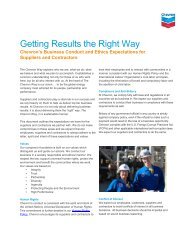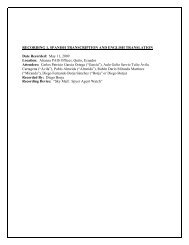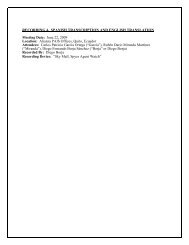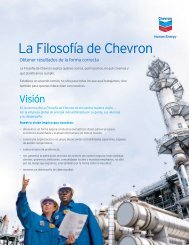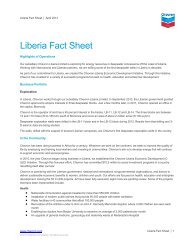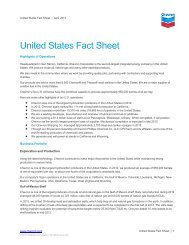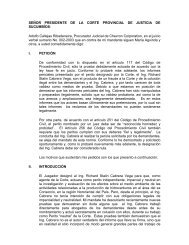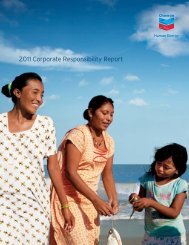Download PDF - Chevron
Download PDF - Chevron
Download PDF - Chevron
You also want an ePaper? Increase the reach of your titles
YUMPU automatically turns print PDFs into web optimized ePapers that Google loves.
2002 <strong>Chevron</strong>Texaco Corporate Responsibility ReportSocial IssuesGlobal Work Force DevelopmentBackground: Hiring andTraining Local EmployeesIn recent years, as part of oureffort to develop a global workforce, we have sought to fill anincreasing number of positionswith employees who are citizensof countries where we operate,A computer class at Mina Saud, rather than with expatriatewhere Saudi Arabian Texaco operates employees. These efforts stema storage and marine export facility. from recognition of the businessvalue of having a work forcethat reflects the markets we serve and the communities where weoperate. Hiring and training local employees are also important waysthat <strong>Chevron</strong>Texaco contributes to the long-term social and economicdevelopment of the communities where we operate. Additionally, somegovernments where we operate have specific requirements regardingwork-force composition.Approach: Developing a Representative Work ForceWe seek to hire and train employees from the countries where we operate.In particular, we are working to continually increase the number oflocal employees in management and technical positions. Many of ourbusiness units have formal programs to recruit and train local employees,in some cases partnering with universities or other institutions in thecommunity to provide training programs. Many also have mentoring orcoaching programs to help support and develop employees.<strong>Chevron</strong>Texaco also seeks to provide employees with internationalwork experience to help them develop the skills and knowledge necessaryfor the company to compete globally. For example, through ourcorporate International Development Program, we provide highpotentialemployees with opportunities to obtain undergraduate andadvanced degrees and work experience outside their home countries.The program manages approximately 300 employee developmentassignments each year. There are a variety of other such programs atthe business-unit level.Performance: Demonstrating Success Worldwide<strong>Chevron</strong>Texaco does not collect corporatewide data on employees’country of origin, although many of our business units have set, andmeasure performance against, specific work-force composition objectives.For example:> Angola:<strong>Chevron</strong>Texaco’s Angolan subsidiary, Cabinda Gulf Oil Co. Ltd.(CABGOC), launched an effort to increase the percentage of Angolannationals within the company’s work force, particularly at the managementlevel. New processes being employed include annually identifyingthe development needs for employees, creating mentoring and trainingprograms to support and develop Angolan employees, and offering targeteddevelopment assignments to high-potential nationals. The effortalready has brought results. In 2002, 85 percent of CABGOC’s total workforce was Angolan. At the professional and supervisor level, 64 percentof the positions were held by Angolans, up from 53 percent in 2001. Bythe end of 2006, CABGOC’s goal is to nationalize 80 percent of its professionaland supervisory staff.> Latin America: <strong>Chevron</strong>Texaco’s Latin America Business Unit (LABU)also has developed a program to increase the number of nationalswithin its work force. In 2002, almost 90 percent of the work force wasmade up of nationals, up from 85 percent in 2001. While the LABU hasmade progress nationalizing its overall work force, it plans to focus specificattention on nationalization at senior levels. By the end of 2004, itsgoal is to increase the number of nationals in management positions by10 percent. The LABU also has a goal to increase the number of nationalson assignments outside their home countries by 10 percent.> Kazakhstan: Tengizchevroil (TCO), <strong>Chevron</strong>Texaco’s joint venture inKazakhstan, employs about 3,500 people. In 1993, about 55 percentof the jobs were held by Kazakh citizens. Since that time, TCO hasengaged in a variety of efforts to increase the number of nationals inits work force. For example, TCO developed partnerships with localuniversities to set up technical training programs to help build theskills of the local work force. As a result, by 2002 the percentage ofjobs held by Kazakh citizens had increased to more than 77 percent.> Saudi Arabia: More than 90 percent of Saudi Arabian Texaco’s (SAT)nearly 700 employees are Saudi nationals. SAT has implemented avariety of strategies aimed at increasing the number of jobs held bySaudi nationals, including providing resources, education, trainingand development opportunities to national employees at all levels.SAT’s employee development programs focus on job performancecompetencies and leadership skills. In recognition of these nationalizationprograms, in 2003 SAT received the First Class Award of thePrince Nayef National Awards.© 2003 <strong>Chevron</strong>Texaco Corporation. All Rights Reserved.28





